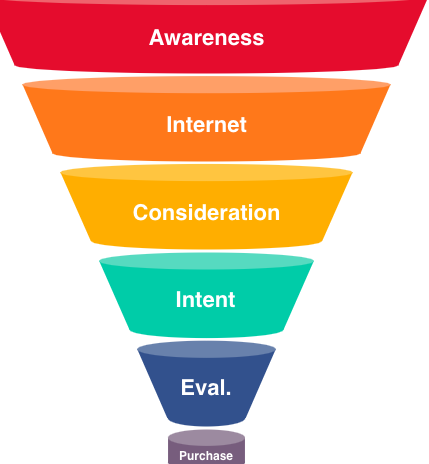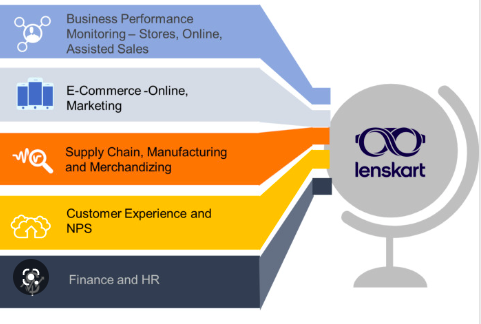Marketing Funnel
Definition
A marketing funnel is a model businesses use to visualise the journey a potential customer goes through to become a paying customer.
Description
The funnel metaphorically represents the process, starting with a wide opening at the top and gradually narrowing down towards the bottom. The marketing funnel typically has four stages:
- Awareness: At the top of the funnel, potential customers become aware of a brand or product through advertising, social media, word-of-mouth, or other marketing channels.
- Interest: In this stage, potential customers show interest in the product or service by visiting the website, signing up for a newsletter, or engaging with the brand on social media.
- Decision: Here, potential customers are considering whether or not to make a purchase. They may read reviews, compare prices, or ask for recommendations from friends and family.
- Action: At the bottom of the funnel, the potential customer purchases and becomes a paying customer.
A valuable tool for businesses because it provides a framework for understanding potential customers’ journey when making a purchase decision.
By breaking down this journey into stages, businesses can create targeted marketing strategies to move customers through the funnel and convert them into paying customers.
Importance of Marketing Funnel
The marketing funnel is important for businesses for several reasons:
- Helps understand customer behaviour: The marketing funnel provides a framework for understanding the customer journey, from initial awareness to final purchase decisions. This understanding helps businesses tailor their marketing strategies to the needs and preferences of their potential customers.
- Improves targeting: By understanding the different stages of the funnel, businesses can target their marketing efforts more effectively, reaching potential customers at the right time and with the right message.
- Increases conversion rates: By guiding potential customers through each stage of the funnel, businesses can increase the likelihood that they will make a purchase. This can lead to higher conversion rates and increased revenue.
- Improves customer retention: The marketing funnel continues after the purchase decision. By continuing to engage with customers after the sale, businesses can increase customer loyalty and encourage repeat purchases.
How to create a marketing funnel for a brand?
Here are the steps to create a marketing funnel for a brand:

- Define your target audience: Identify your ideal customer persona, including demographic information, preferences, and pain points.
- Create awareness: Develop a strategy to raise brand awareness using social media, paid advertising, content marketing, and other channels. The goal is to attract potential customers to your brand and generate interest.
- Nurture leads: Once you have attracted potential customers, engage with them through email marketing, retargeting ads, and other tactics to keep your brand top-of-mind and build a relationship.
- Encourage decision-making: Use social proof, testimonials, reviews, and other tactics to persuade potential customers to purchase.
- Close the sale: Make purchasing easy for potential customers with clear calls to action, simple checkout processes, and responsive customer support.
- Foster loyalty: Continue to engage with your customers after the sale with email marketing, loyalty programs, and other tactics to encourage repeat purchases and referrals.
- Measure and optimise: Use analytics tools to track your marketing funnel metrics, including traffic, conversions, and revenue, and continually optimise your strategy based on what’s working best.
Future Strategies to Create Marketing Funnel
Here are a few potential future strategies to create a marketing funnel:
- Emphasise personalised content: Personalization is becoming increasingly important in marketing. Creating customised content and experiences for potential customers will likely be vital to any marketing funnel strategy.
- Leverage emerging technologies: With the rise of artificial intelligence, virtual reality, and other technologies, businesses will have new opportunities to engage with potential customers in unique and immersive ways. For example, virtual reality experiences could be used to showcase products or services, while chatbots powered by AI could provide personalised customer service.
- Prioritise social media: Social media platforms are already a crucial part of many marketing funnels and will become even more critical in the future. Brands must continue finding new and creative ways to engage with potential customers on social media while leveraging emerging platforms and features.
- Focus on sustainability and social responsibility: As consumers become increasingly concerned about sustainability and social responsibility, brands prioritising these values will have a competitive advantage. Incorporating sustainability and social responsibility into your marketing funnel strategy can help build brand loyalty and attract like-minded customers.
- Embrace omnichannel marketing: In the future, businesses must bring an omnichannel approach to the market, ensuring potential customers can engage with their brand across multiple channels and touchpoints. This may involve developing new media, such as voice assistants or messaging apps, or optimising existing channels to provide a seamless customer experience.
Example

One example of an Indian brand successfully implementing a marketing funnel is Lenskart, an online eyewear retailer. Here is an overview of how Lenskart’s marketing funnel works:
- Awareness: Lenskart uses a variety of marketing channels, including TV ads, social media, and influencer marketing, to generate awareness of its brand and products.
- Interest: Once potential customers know of Lenskart, the company uses targeted ads and email marketing to keep them engaged and interested. For example, Lenskart sends personalized emails with product recommendations based on the customer’s browsing history.
- Consideration: To encourage potential customers to make a purchase, Lenskart offers a variety of discounts and promotions. They also have a virtual try-on feature, which allows customers to see how different frames will look on their faces.
- Conversion: Lenskart makes it easy for customers to purchase their products with a simple checkout process and multiple payment options. They also offer a 14-day return policy, which helps build trust with potential customers.
- Retention: After the sale, Lenskart continues to engage with customers through personalised emails, special offers, and a loyalty program. This helps encourage repeat purchases and builds brand loyalty.
FAQs
What is a marketing funnel?
A marketing funnel is a model that represents the customer journey from the initial awareness of a product or service to the final purchase decision.
It’s called a funnel because, just like a funnel, it narrows as customers move through the journey stages, with a decreasing number of prospects at each stage.
What are the stages of the marketing funnel?
The stages of the marketing funnel are usually defined as follows:
- Awareness: At this stage, potential customers become aware of your product or service.
- Interest: At this stage, potential customers express interest in your product or service and want to learn more about it.
- Consideration: At this stage, potential customers evaluate your product or service and compare it with other options.
- Intent: At this stage, potential customers purchase your product or service.
- Purchase: At this stage, potential customers become actual customers by purchasing.
Why is the marketing funnel important?
The marketing funnel is important because it helps businesses understand the customer journey and optimise their marketing efforts to increase sales and revenue.
By tracking the performance of each stage of the funnel, businesses can identify areas for improvement and make data-driven decisions to drive growth.
How can businesses optimise their marketing funnel?
There are several ways businesses can optimise their marketing funnel, including:
- Creating high-quality content that resonates with potential customers at each funnel stage.
- Using targeted advertising to reach potential customers at each stage of the funnel.
- Providing personalised experiences to potential customers based on their behaviour and preferences.
- Offering incentives and promotions to encourage potential customers to move through the funnel.
- Analysing data and making data-driven decisions to optimise each stage of the funnel.
Can the marketing funnel be applied to any type of business?
Yes, it can be applied to any type of business, regardless of size or industry. However, the specifics of the funnel may vary depending on the business and its target audience.
Therefore, it’s essential to tailor the marketing funnel to the specific needs and preferences of the target audience.





We would love to have your opinion.